PRIMITIVO ESTATE – MARIO ROMULIĆ’S SUSTAINABLE PARADISE A return to nature through food and tradition
Primitivo is not just a place to relax, it's a true paradise where tradition, gastronomy, and ecological awareness merge into a unique experience. Life and cooking here follow the rhythm of nature — from field to table — using recycled materials, wild herbs, and old-fashioned methods of food preparation.
The softest shades of green were painting the still-bare trees after a long and cold Baranja winter when we visited the Čudesna Šuma (Enchanted Forest) eco-estate on one of the last winter days. This fairy-tale-like spot is located in Bilje, just a ten-minute drive from the center of Osijek and near the Kopački Rit Nature Park.
They say that winter either bites with its teeth or lashes with its tail, and that Sunday morning it did just that. Days before, spring-like temperatures had warmed us, though spring hadn’t officially begun, only for winter to return with its frost and rain.
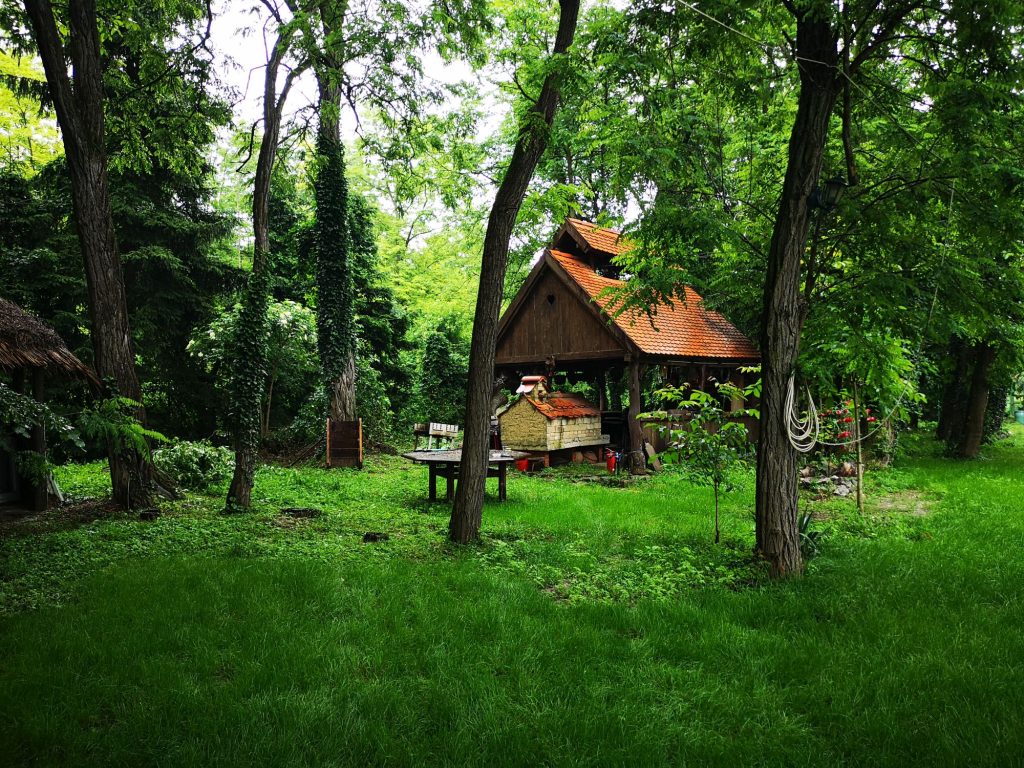
Yet, the Romulić family estate stood defiantly green. True, the trees in the yard and forest were just beginning to bud, but the wild herbs were already showing their strength, having survived the winter. So too was the perennial collard, springing proudly from raised beds, as green as a forest.
Mario Romulić, the owner of this family farm, greeted us — as expected — while working. He was painting a fence, as his days are too short to fit all his plans and goals.
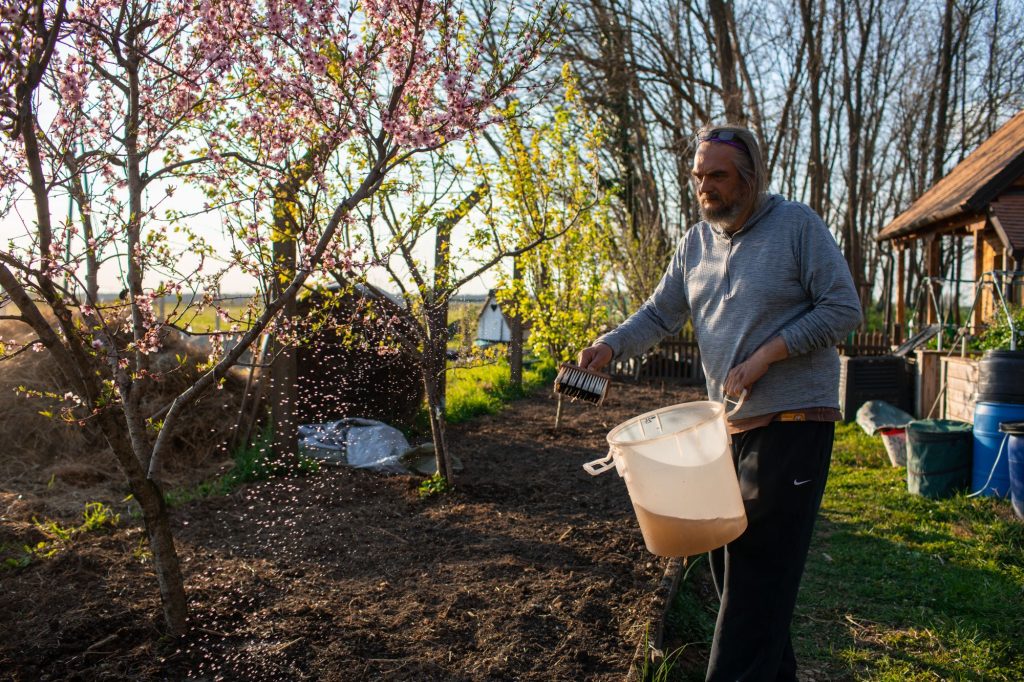
A holistic approach to food production
This unique character and Osijek native, a renowned and award-winning photographer, decided a few years ago to drop anchor in the Baranja wetlands. “I have everything I need here. I hate going to the city,” he says with a smile when asked if he misses his old life — traveling, the adrenaline, the bustle. Now, his focus is on nurturing tomato and pepper seedlings in the greenhouse he built with his sons. There’s planting to be done, multiple types of pumpkins to be sown, as well as culinary and medicinal herbs to be grown in Hügelkultur beds. The 250-meter-long labyrinth with a variety of plants could use some maintenance as well.
And then there’s hemp to care for, with its seeds used to make oils, creams, and other products. Luckily, the forest of food he started some four years ago mostly takes care of itself. Even though the wild herbs reseed naturally, the forest with its fruit trees that feed bees, birds, and other animals still needs some tender loving care.

Mario practices biodynamic farming, meaning he treats the entire estate as a living organism where plants, animals, and soil are interconnected. Nothing and no one is considered an enemy or pest. The production is fully organic, with soil fertility maintained through compost, manure, and biodynamic preparations, aiming for a self-sustaining, harmonious system free of synthetic chemicals.
Now, this could have remained a local story about a passionate man wanting to know what he’s eating or a Baranja “wizard” who harvests wild herbs because to him, there’s no such thing as a weed. But it has evolved into something much greater — an estate open to visitors and a true paradise for nature lovers and foodies alike.
Exhibition space, lab, and gastro oasis
The Primitivo estate created by Mario Romulić is not just a place to rest and enjoy nature. It’s also an exhibition space, a workshop, and a gastronomic oasis. Everything you can see, touch, and taste here was made by Mario, with the help of his sons Ivor and Svebor, and craftsman Viktor.
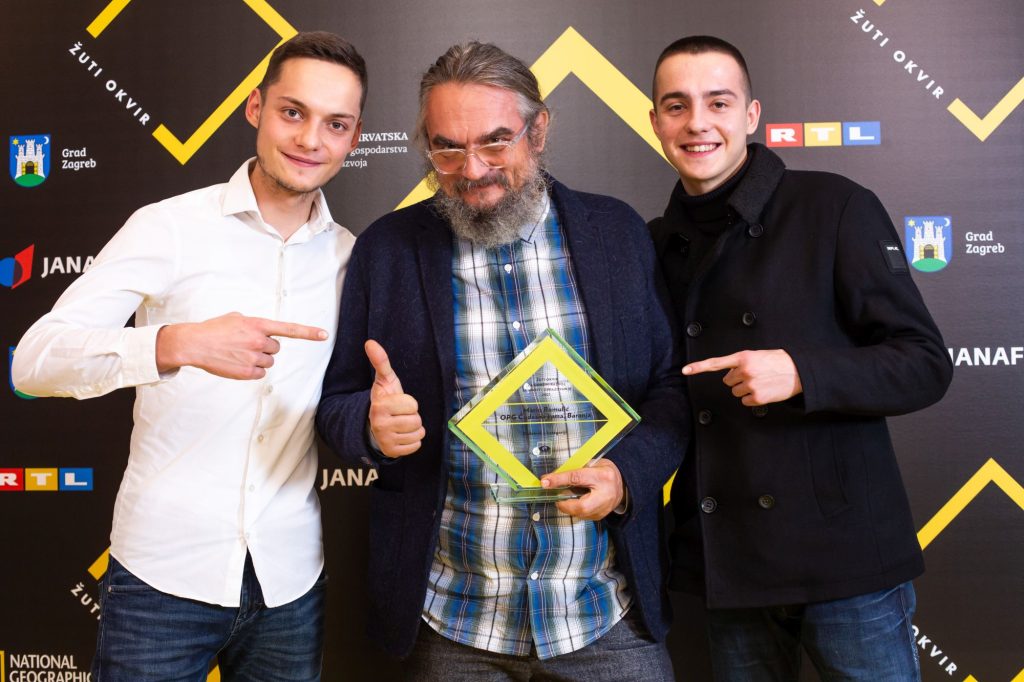
“We built it all ourselves, from the foundations to the roof, furniture and fencing,” he says as we sit at a massive oak table, sipping homemade herbal brandy. The beams, he explains, were once poplars in a nearby forest. “We dragged them out, cut them, dried, charred, and installed them. Everything is made from recycled materials, discarded wood, and old furniture. Doors, shelves, benches — they were once someone’s trash. We find fruit trees, walnut trunks, or logs left to rot and turn them into something useful and beautiful.”
Self-sufficiency is the cornerstone of the entire estate. Mario grows vegetables, fruits, hemp, and other foods, guided by the farm to table philosophy.
“Our goal is to serve food we've grown ourselves to groups of up to 25 guests. Everything is homemade and organic. We make our own spices, teas, remedies; we preserve and ferment food, make jams and pickles, and bake sourdough bread only.All cooking is done the traditional way — over open flame, in clay or cast-iron pots”, Mario showcases many, which line the shelves not as decoration but as working tools. The name Primitivo, he says, reflects a return to how people lived 50 or 100 years ago.
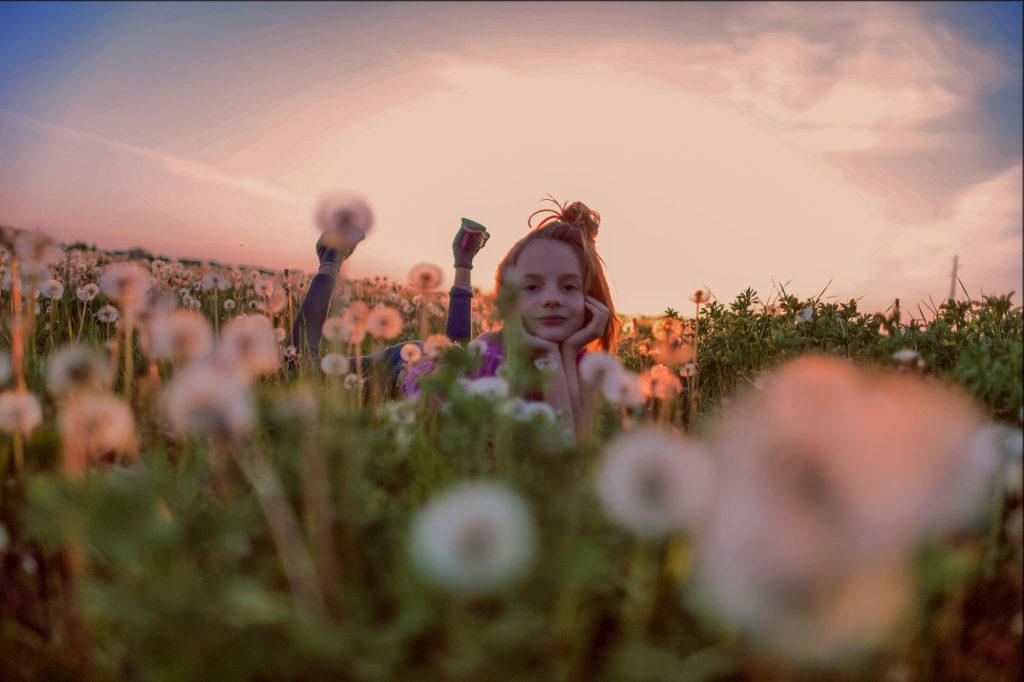
Alongside culinary pleasures, the estate offers educational experiences.
“We also organise workshops on environment protection, natural materials, making cosmetics and remedies — things long forgotten but worth preserving,” he says passionately before returning to preparing the food which he approaches with immense care. With a chef like him, this experience is truly special for every visitor.
Wild herbs enrich every dish
Slow cooking is central — some dishes take six hours, others up to 24. They use Danube fish, wild game meat, and other ingredients exclusively from local farms that grow food without pesticides or chemicals. “Guests love our oxtail perkelt, smoked carp, pulled pork, and ribs. We use kamado smokers and offset methods, combining low-temperature cooking with smoking, which gives the food its distinctive flavour,” explains Mario, who enhances every dish with wild herbs from his garden.
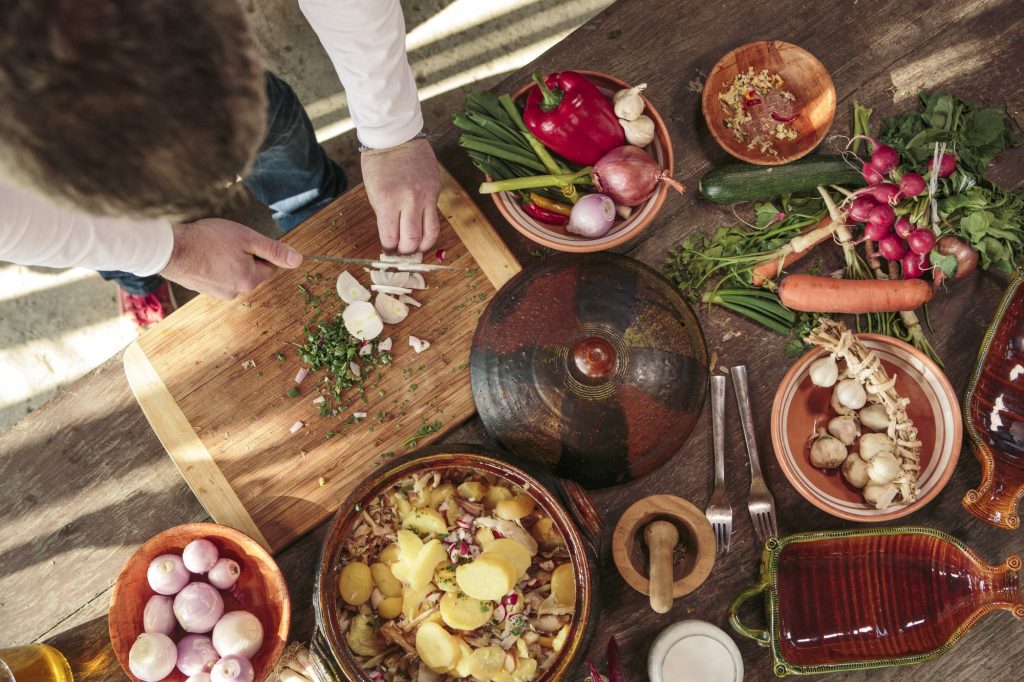
“We want to show guests how much delicious and nutritious food grows all around without us even realizing. Purslane, nettle, dandelions — these used to be common at markets, now they’re labeled as weeds,” Mario says, emphasizing their nutritional value and gourmet potential. He allows guests to pick their own vegetables like peppers, onions, tomatoes, lettuce, and teaches them all about wild edible plants and their medicinal uses. When it comes to fats, Mario only cooks with black pig lard and organic biodynamic olive oil sourced from the Croatian islands of Hvar, Vis, Korčula, and Šibenik.
Having travelled the world thanks to his photography skills, Mario lists the cuisines he loves, highlighting Moroccan, Argentine, and Thai. “I love to cook and explore different cuisines, but I always choose what suits our lifestyle and diet,” he says with conviction.
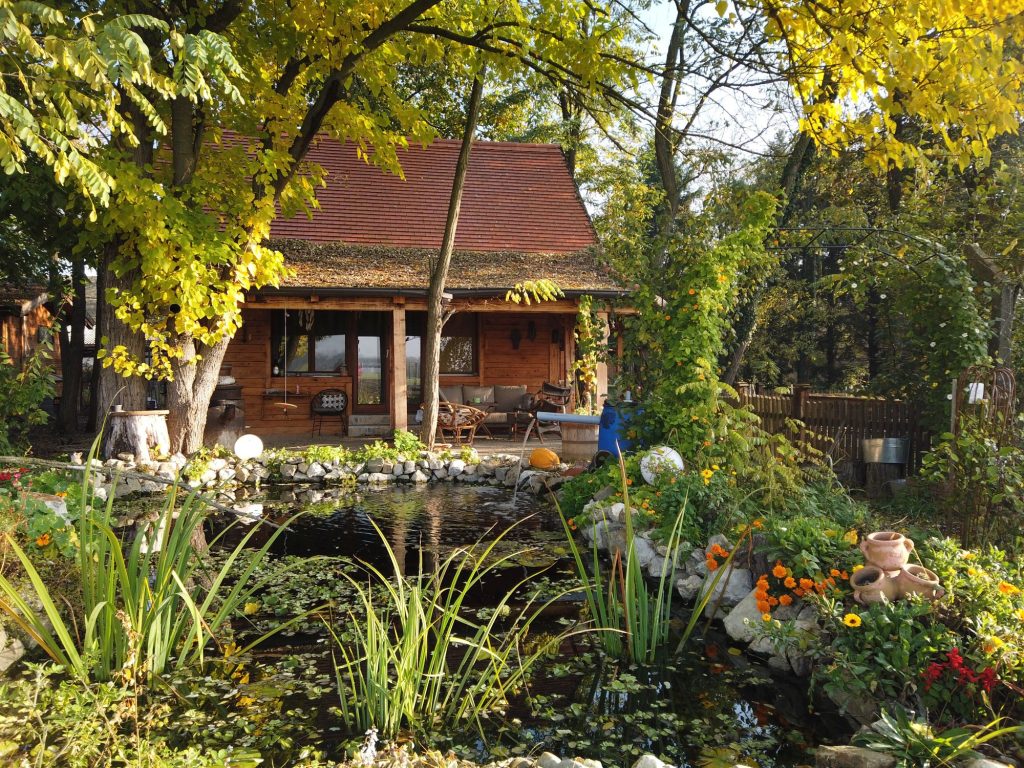
“Our goal is to serve food we've grown ourselves to groups of up to 25 guests. It is all homemade and organic. We make our own spices, teas, remedies; we preserve and ferment food, make jams and pickles, and bake sourdough bread only.“
Who is Mario Romulić?
One of the most recognised photographers in Croatia. He has travelled the world with a camera in his hand, including many war zones. He is also known for his wildlife photographs, especially those from Kopački rit Nature Park, which is near his Utopia.
Eco-estate Čudesna šuma (Enchanted Forest): www.cudesna-suma.hr
Written by: Maja Celing Celić